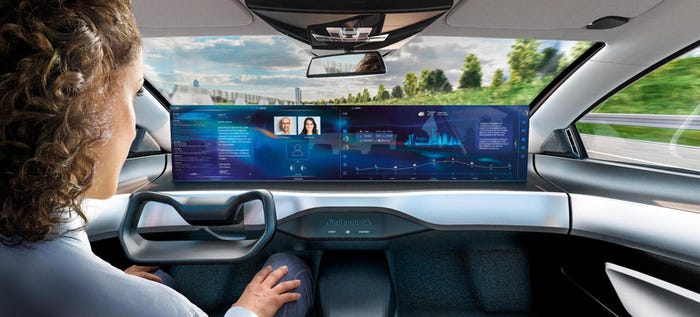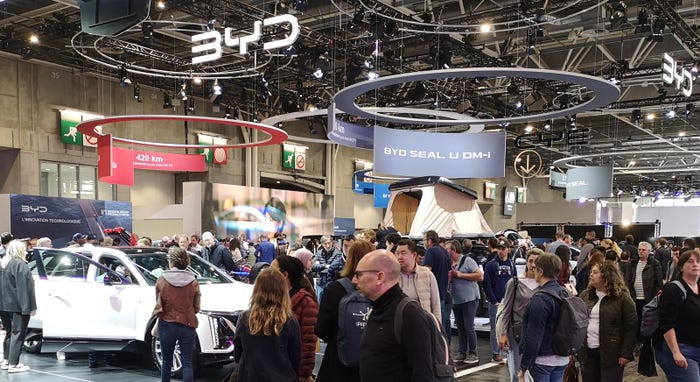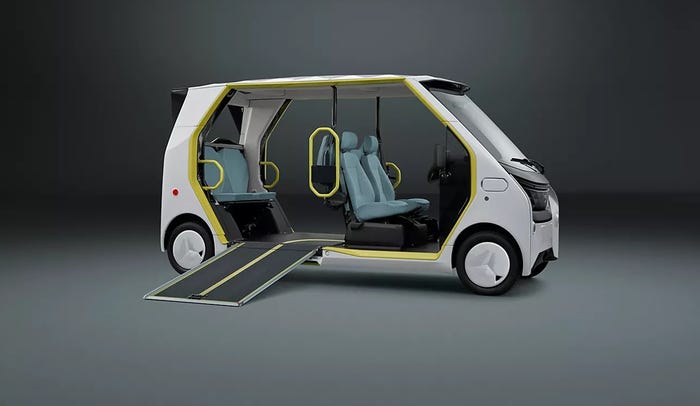Mobility Pioneer Borroni-Bird Turns Focus to Developing World
Playing off the word Africa, the mobility startup Afreecar is Borroni-Bird’s answer to sustainable, low-cost transportation and electricity for developing economies. His proof-of-concept is an e-trailer.

Longtime engineering executive Chris Borroni-Bird brought to life some of the automotive industry’s first alternative mobility solutions for the developed world, and now he wants to do the same for developing regions such as sub-Saharan Africa.
“My whole career has been focused on solving problems for the developed world, but my passion is around the developing world,” says Borroni-Bird, whose 25-year career includes leading mobility projects at the former Chrysler Group, General Motors and more recently Waymo, the Massachusetts Institute of Technology and Qualcomm.
Playing off the word Africa, the mobility startup Afreecar is Borroni-Bird’s answer to sustainable, low-cost transportation and electricity for developing economies. His proof-of-concept is an e-trailer developed in conjunction with the University of Michigan and the suburban Detroit engineering house Pratt & Miller.
Coupled to a bicycle, the lightweight trailer includes a 5-ft. by 3-ft. (1,524-mm by 914-mm) solar-panel roof for charging a secondary-use lithium-ion battery. The battery powers an electric motor to turn the trailer’s wheels and provide pedal assist.
Borroni-Bird estimates the emissions-free vehicle could travel on a single charge up to 50 miles (80.4 km), which would easily satisfy trips between villages. Top speed would be about 15 mph (24 km/h), which is about the speed of a bicycle but 5 times faster than walking, as nearly all inter-village travel is conducted today.
The Afreecar would be locally built, creating jobs, use recycled materials and standard electrical components. The owner’s smartphone would manage charge levels, provide route information and the optimal angle for the solar panel to catch sunlight. There is no shortage of sun in sub-Saharan Africa, either, even during the rainy season, Borroni-Bird notes.
Borroni-Bird came up with the idea for Afreecar while volunteering in West Africa a decade ago. He saw how solar panels donated to one village were used to recharge batteries, which replaced kerosene lighting with low-cost LEDs to extend the work day; converted grain milling from a physical process to mechanical; and allowed residents to pump deeper, cleaner water from their wells.
One day while working on water pumps, Borroni-Bird also found himself walking 10 miles (16 km) between villages, a time-robbing daylong trip performed every day by millions of locals who cannot afford a car. The alternative in most places is a bus, which often stop just once a week. He knew then one alternative could be an inexpensive, lightweight battery-powered vehicle with solar panels that were becoming increasingly inexpensive.

Borroni-Bird creating transportation, power solution for developing world.
“Transport is an enabler,” he tells Wards in an interview. “It gives back time to do other things. It is certainly an enabler to accessing jobs and generating income, access to health care and educational resources.
“Transportation is really a means to an end,” he adds. “You generally don’t really travel for the sake of traveling. You travel with a purpose in mind, and that purpose is to improve your quality of life.”
An important piece of Borroni-Bird’s idea is localized production. In addition to new jobs it could create, it would reuse an abundance of parts from vehicles and other machines, many of them already sorted and for sale in local markets. Another option would be using renewables, such as bamboo, as Zambian bicycle maker Zambikes has demonstrated.
Borroni-Bird says the locals he has encountered in Africa have the expertise in reuse to not only build the e-trailer, but perhaps improve upon his design.
“They could come up with new ideas and new uses for this type of vehicle,” he says. “It will unleash their creativity. And the beauty of it being made out of local materials is when something fails it can be replaced easily.”
However, the key components would come from a standardized, mass-produced e-kit of high quality similar to the ready-to-assemble furniture and home accessories from IKEA. The e-kit would include the solar panel, battery module, controller and a small electric motor.
“The pitch I’m making is you’re not going to make money on the vehicle. It’s meant to be made locally by communities to generate jobs,” Borroni-Bird says. “But where a company could make money is in licensing the software. Or maybe a community gets the software for free but provides data back, and that data could be very valuable.”
Another business model Borroni-Bird proposes would see a local company or entrepreneur assemble the vehicles and lease them to the community. The bike and e-trailer also could be operated independently, with two people biking/riding to a location where the vehicle is decoupled, and one person bikes off to make deliveries and the second stays with the trailer to monetize the electricity.
But at the end of the day, everyone benefits from greater mobility and electricity.
The developed world could use the e-trailer idea, too, he says. It could be manufactured with a 3-D printer from excess plastic and used to deliver food, or perhaps pharmaceuticals, in isolated urban areas. Urban farmers might find the e-trailer handy, too.
Borroni-Bird says he is not to the point in the venture where he would necessarily seek investors, although a Detroit-area firm is supporting creation of a demonstrator. Down the road, he would seek backing to launch a pilot program.
“It is a high-tech, low-cost solution, and those two usually do not go hand-in-hand,” he says.
About the Author
You May Also Like



.jpg?width=700&auto=webp&quality=80&disable=upscale)

